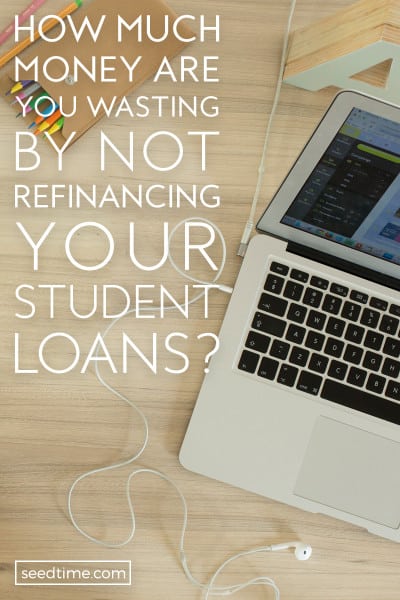The average student owes $35,051. If you owe student loan debt in this range or higher, you may be wasting money by not refinancing.

Whether or not you can benefit by refinancing your student loans will depend upon the interest rate that you are paying on your current loans.
Private source student loans usually carry higher interest that includes variable rates that could start low, but rise over the course of the loan term. Private student loans are also credit-based, so interest rates can run into double digits if you have less-than-perfect credit.
Here’s information that you can use if you are interested in refinancing your student loans.
Know the Difference Between Student Loan Refinancing and Consolidation
When it comes to student loans, the terms “refinancing” and “consolidation” are sometimes used interchangeably. In fact, they are two very different processes, and generally involved two different student loan types.
Student loan refinances are provided by private money sources, such as banks and online lending platforms. They can be used to refinance both federal student loans and private student loans.
The advantage of a refinance is replacing existing student loans with a new loan that offers a lower rate of interest. This can often result in a lower monthly payment, which can be made still lower if you can also extend the repayment term of the loan.
The disadvantage of doing a student loan refinance is that you must credit qualify for the loan. The lender providing the refinance will consider your credit history, your income, and your debt-to-income ratio in determining whether or not to extend you a loan. For this reason, refinances work best for borrowers with strong financial positions. A weak financial position can result in either higher rates than you currently have, or outright loan decline.
Student loan consolidations are available only for federal student loans. The general purpose is to consolidate several federal loans into a single loan with one monthly payment. Unlike student loan refinances, consolidations do not require that you be credit qualified in order to take the loan.
The primary negative with a consolidation is that it will not lower your rate of interest on your loans. Consolidation loans instead use a weighted average of the rates you are paying on your current outstanding student loans. If you have several loans, that weighted average will result in a new rate that is lower than the rate on some loans, but higher than on others. However, you can still have a lower monthly payment on a consolidation loan if the term on the new loan is longer than the various terms on your current loans.
Still another disadvantage of consolidations is that they apply only to federal student loans and not private loans.
We’re going to discuss student loan refinances in this article. If you would like to consider a consolidation loan instead, you can get more information at Student Loans.org from the US Department of education.
Be Careful When Refinancing Federal Student Loans!
In refinancing your student loan debts, it’s important to understand that interest rate is not the only consideration. Federal student loans come with certain consumer protections, and those protections will be lost in the event that you refinance those loans through a private lender.
Those protections include emergency forbearance as well as income-based repayment plans (IBRs) and public service loan forgiveness (PSLF), that will enable you to either lower your monthly payments based on your income, or have your loans forgiven entirely by working in government jobs for at least 10 years.
Where to Refinance Your Student Loans
One of the more popular student loan refinance companies is:
SoFi Student Loan Refinancing
SoFi is coming up quickly as an online peer-to-peer lending platform that specializes in student loan refinances. One of the biggest advantages SoFi offers is in its underwriting criteria: the platform uses nontraditional credit underwriting, and considers merit (education and career experience) and employment history, in addition to your credit profile. SoFi states that their members save an average of $14,000 when refinancing their student loans through the platform.
You can refinance both federal and private student loans and there are no application or origination fees. Loan terms can be up to 20 years. Fixed rate APRs range between 3.50% and 7.74%, while variable rate APRs are between 2.13% and 5.93%. You can refinance up to the full balance of your qualified education loans.
SoFi also offers unemployment protection. In the event you lose your job, your loan payments will be suspended for up to 12 months. In the process, SoFi will actually help you to find a new job.
Have you refinanced your student loans? Why or why not?
Let us know in the comments below!




